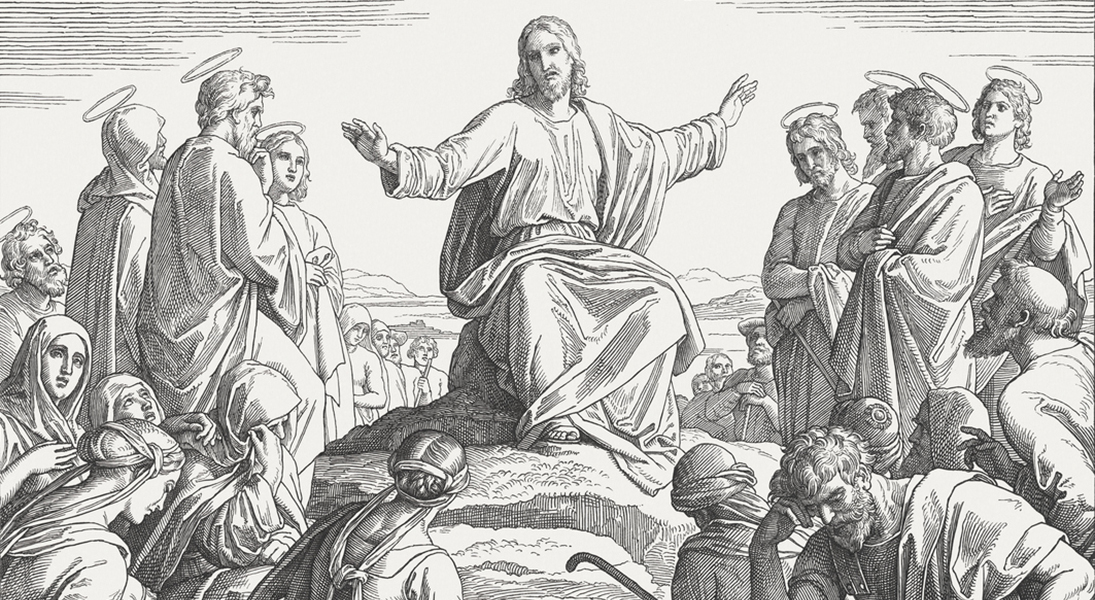Lectionary blog for Jan. 29
The fourth Sunday after the Epiphany
Micah 6:1-8; Psalm 15;
1 Corinthians; Matthew 5:1-12
All parents have things they say so often that, eventually, their children can predict what mom or dad will say before they say it. My daddy’s was; “Is that absolutely necessary?”
Child: “May I go with you?”
Daddy: “Is that absolutely necessary?”
Child: “Can I buy a new toy truck?”
Daddy: “Is that absolutely necessary?”
Whenever Daddy said that, I usually wanted to say, “No Daddy, I just thought it would be fun; after all, I am a kid,” but because my daddy was severely sarcasm-challenged, I usually just responded with the time-honored and kid-tested, “Please, please, can I, can I, please, please!?”
The trouble with this parental line, and others like it, is that after one hears the line a few hundred times, one stops listening; one no longer really pays any attention to what is being said.
Many of us have the same problem with the Beatitudes. We have heard these words so often that we think we know what Jesus is saying before he says it. And here is the really difficult and somewhat sad truth: Most of us have come to an uneasy peace with the belief that we can’t really do what he is asking of us. We have concluded, either out loud or in our heart of hearts, that he is calling us to a standard higher then we believe to be humanly possible.
Yes, we have forgiven ourselves for our inability to live up to the Sermon on the Mount, and we occasionally wonder if, after all, such high standards are absolutely necessary. It’s all well and good to say that the hungry will be blessed, but what the hungry really need is to be fed. The last century has seen more death by cruelty and violence than the previous 19 combined; there are many more who mourn than ever before, and heavenly reward is cold comfort in the face of today’s hot pain.
The last time I looked, the meek were still being trampled underfoot, and the strong and the unscrupulous were still in possession of most of the earth. As for those hungering and thirsting after righteousness, well, it appears to most of us that most people spend most of their time hungering and thirsting after the rewards of the flesh, better known as creature comforts, or “a certain lifestyle.”
So, when we hear what Jesus says in the Sermon on the Mount, it appears to be far removed from the world as we know it. So we nod our heads and listen politely and think nice thoughts about being meek and hope that reading a two-minute devotional every morning counts as hungering and thirsting after righteousness. Then we go out the door and into the world and about our business.
Our mistake is to think that the Sermon on the Mount is about us, about our personal behavior, that it is kind of like a graduation speech in which a wise and witty famous person explains to us the nine secrets of lifestyle success or “How to Be a Happy Christian.”
Well, the Sermon on the Mount is not Jesus’ Little Instruction Book. It is, rather, a proclamation of the coming of the kingdom of God. It is a rallying cry aimed at those called by God to become a part of that kingdom. Notice where it is in the Gospel of Matthew. In Chapter 1 and 2, Jesus is born and grows up. In Chapter 3 he is baptized. In Chapter 4 he goes into the wilderness and clarifies his mission through a temptations dialogue with the devil. Now, in Chapter 5, he comes out of the desert and begins to preach.
In these opening words, Matthew shows Jesus announcing his plan, his program, his priorities for everyone to hear, for everyone to either accept or reject. Here, Jesus divides the world into two categories—the haves and the have-nots.
In verses 3 through 6, Jesus says the have-nots are those the world has beaten up and beaten down, those who have lost both their dignity and their hope. There is no need to spiritualize these things; this is about cold, hard facts. The world is full of poor people, the world is full of people who mourn; the world is teeming with the meek, those the powers that be have pushed under and held under so long that they can’t remember up, much less see it. The world is full of those who seek justice, of those who have been deeply, deeply wronged by pure injustice. These are the people Jesus is talking about.
In verses 7 through 10, Jesus talks about the rest of us, the haves, and where we count in this new kingdom. In a world full of war, we are called to make peace. In a world full of injustice, we are called to do justice with a pure heart. In a world full of oppression, we are called to stand with the oppressed and to help them find mercy. In a world full of people being treated unjustly, we are being called to stand with them and to allow ourselves to be treated unjustly with them in hopes of relieving their distress.
In the Sermon on the Mount, Jesus unveils, reveals, the kingdom of God. It is a kingdom that includes all of us. If we are down, it seeks to pull us up. If we are up, it seeks to pull us into the battle on behalf of the least of these, the brothers and sisters of Christ. Jesus’ Sermon on the Mount is not an unreasonable, unattainable, idealistic pipe dream of a higher standard. No, it is a clear and unmistakable call for us to join the battle for the kingdom of God. This day Jesus invites us to a life of service and sacrifice, to a life of caring and compassion. In the words of Micah: We are called to do justice, love kindness and to walk humbly with our God.
Amen and amen.










